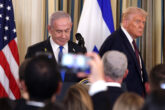August 29, 2018
Ex-Pentagon Adviser: US-Taliban Talks an ‘Icebreaker’
The United States and the Taliban are reported to be in the early stages of discussions for the first time since 2012. Retired U.S. Army Colonel Christopher Kolenda, who fought in Afghanistan and later served as a senior Pentagon adviser, was instrumental in helping set up those talks — in part through his own discussion with Taliban officials in Qatar. He spoke with VOA’s William Gallo about where he sees the peace process going, especially in light of a recent surge in violence. This interview was condensed for clarity.
William Gallo: How would you characterize the current U.S.-Taliban talks?
Christopher Kolenda: We’ve had a situation in which each of the three main parties — the Afghan government, the Taliban, and the United States — have all been wanting talks but have put conditions on starting talks that the other side can’t meet.
So this effort for a conversation between the U.S. government and the Taliban, which has happened in full coordination with the Afghan government, is meant as an icebreaker to lead to a negotiating process in which the Taliban and the Afghan government begin discussions about the political future of Afghanistan. Because only Afghans can solve that.
Gallo: Is there any indication these talks have moved into more advanced stages?
Kolenda: Not to my knowledge. It seems there was a discussion and then things are on hold a bit. There’s rumored to be another round of U.S.-Taliban talks in Doha in early September.
Read the Full Interview at Voice of America
More from CNAS
-
How a Peace Deal Between Hamas and Israel Will Reshape the Middle East
Rachel Brandenberg joins NPR to discuss how the region will change if Israel and Hamas continue to abide by the peace deal President Trump brokered. Listen to the interview o...
By Rachel Brandenburg
-
Donald Trump’s Gaza Plan Skips Step One
The White House proposal attempts to solve too many distinct issues all at once, without enough input from Palestinians....
By Delaney Soliday
-
Analyzing Trump’s 20-Point Peace Plan for Israel and Gaza
President Trump and Israel's Prime Minister Benjamin Netanyahu are urging Hamas to accept the latest U.S. peace plan to end the war in Gaza. Trump says if Hamas rejects the 20...
By Rachel Brandenburg
-
Fourth Time’s a Charm? How Trump Could Push Netanyahu into Ending the Gaza War
Trump's new Gaza plan has a weak point: It clashes with Netanyahu's promises to his voters....
By Rachel Brandenburg




